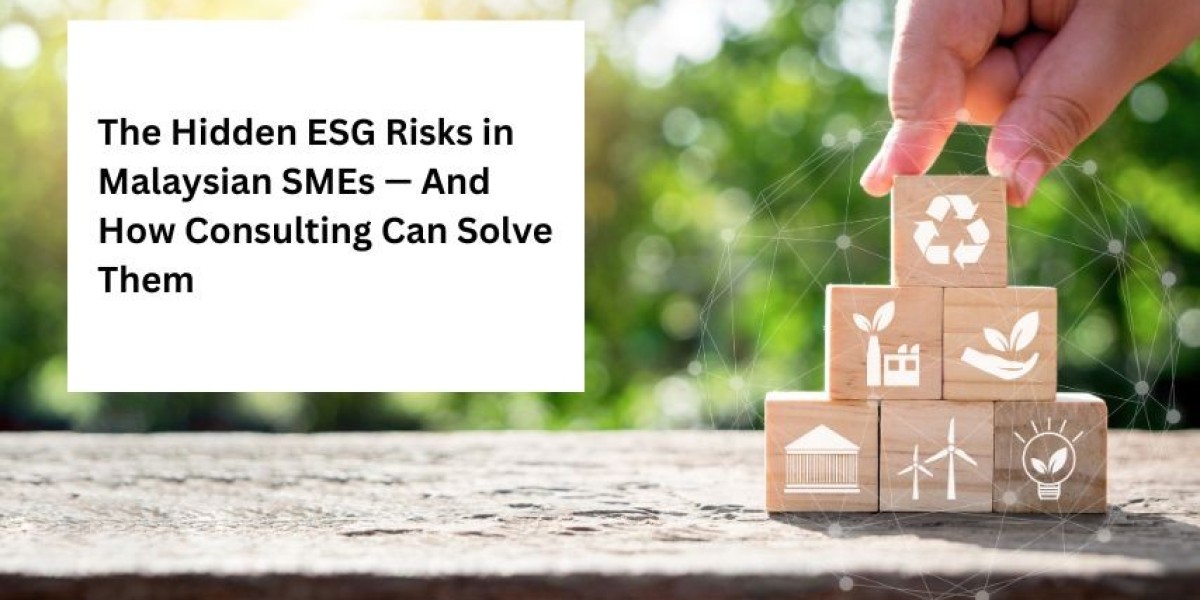Environmental, Social, and Governance (ESG) principles are increasingly shaping the global business landscape. While multinational corporations have dominated the conversation, Small and Medium Enterprises (SMEs) in Malaysia are discovering that ESG is no longer an optional extra but a critical component of long-term success. Many SME owners believe these standards are too complex or costly to implement, unaware that they are already exposed to significant hidden ESG risks.
These risks, lurking beneath the surface of daily operations, can disrupt supply chains, attract regulatory penalties, and damage a hard-earned reputation. The challenge for Malaysian SMEs is not a lack of ambition, but a shortage of resources and specialized knowledge to navigate this new terrain.
This article will uncover the specific ESG risks that Malaysian SMEs often overlook. We will explore the practical challenges they face and demonstrate how strategic consulting can provide the tools, expertise, and roadmap needed to transform these risks into opportunities for growth, resilience, and sustainable success.
Understanding ESG in the SME Context
Before diving into the risks, it's important to demystify ESG. At its core, ESG is a framework for evaluating a company's performance beyond traditional financial metrics. It's about building a more responsible and resilient business.
- Environmental (E):This pillar considers how your business impacts the natural world. It includes your energy consumption, waste management practices, resource use, and carbon footprint. For a Malaysian SME, this could be as simple as how you dispose of factory waste or the fuel efficiency of your delivery fleet.
- Social (S):This focuses on your relationships with people—employees, customers, suppliers, and the community. Key issues include labor standards, workplace health and safety, diversity and inclusion, and how your products affect consumers. It’s about being a good employer and a responsible corporate citizen.
- Governance (G):This refers to how your company is run. It covers your internal policies, leadership structure, executive pay, internal controls, and shareholder rights. For an SME, this means having transparent decision-making processes, ethical business practices, and clear anti-corruption policies.
SMEs form the backbone of Malaysia's economy, accounting for over 97% of all business establishments. Their collective impact on the environment and society is immense, making their adoption of ESG principles crucial for the nation's sustainable development goals.
The Hidden ESG Risks Lurking in Your Business
Many SMEs operate under the assumption that "if it isn't broken, don't fix it." However, ESG risks are often invisible until they trigger a crisis. Here are some of the most common yet overlooked risks for Malaysian SMEs.
Environmental Risks: More Than Just Pollution
Environmental risks extend far beyond obvious industrial pollution. They are embedded in everyday operational choices that can have significant financial and regulatory consequences.
1. Inefficient Resource Management
Many SMEs are unaware of the direct link between resource consumption and profitability. Inefficient use of water, electricity, and raw materials doesn't just harm the environment; it inflates operating costs. For example, a small food manufacturer using outdated machinery might consume 30% more electricity than a competitor with modern equipment. This hidden cost directly eats into profit margins, making the business less competitive.
2. Regulatory Non-Compliance
Malaysia is strengthening its environmental regulations. The Department of Environment (DOE) enforces rules on everything from air emissions to scheduled waste disposal. An SME might be improperly disposing of used machine oils or chemical containers, unaware that they are classified as scheduled waste. A surprise inspection could lead to hefty fines, operational shutdowns, and even legal action against the company directors. The risk of non-compliance is growing as Malaysia aligns with global sustainability standards.
3. Supply Chain Vulnerabilities
Your ESG risk is not just about what you do, but who you do business with. A Malaysian furniture maker might source timber from a supplier engaged in illegal logging. If this is exposed, the furniture maker faces severe reputational damage and potential loss of business, especially from international buyers with strict sourcing policies. Your supply chain can be your biggest unmanaged environmental liability.
Social Risks: People are Your Greatest Asset and Biggest Risk
Social risks are tied to the human element of your business. Neglecting them can lead to high employee turnover, legal disputes, and a tarnished brand image.
1. Poor Labor Practices
In a competitive labor market, how you treat your employees matters. Issues like unpaid overtime, unsafe working conditions, or a lack of formal employment contracts are significant social risks. For instance, a construction SME failing to provide adequate safety gear (PPE) not only violates the Occupational Safety and Health Act (OSHA) but also risks tragic accidents, legal liability, and an inability to attract skilled workers. High employee turnover driven by a poor work environment is a major hidden cost in training and lost productivity.
2. Ignoring Community Impact
Your business does not operate in a vacuum. A small factory causing noise or traffic congestion in a residential area can face community complaints and local council interventions. Conversely, SMEs that engage positively with their local community—by hiring locally or supporting local events—build a strong social license to operate. Ignoring the community can create friction that disrupts business.
3. Product Safety and Responsibility
The products or services you sell carry inherent social risks. A cosmetics SME that fails to list all ingredients accurately could cause allergic reactions in customers, leading to lawsuits and a public relations crisis. In the digital age, a single negative customer experience shared on social media can quickly go viral, causing widespread reputational damage that is difficult to repair.
Governance Risks: The Foundation of Trust
Strong governance is the bedrock of a stable business. For SMEs, where ownership and management are often intertwined, governance risks can be particularly acute.
1. Lack of Formal Policies
Many SMEs run on informal, trust-based systems. While this can work in the early stages, it becomes a major risk as the business grows. Without a formal anti-bribery and corruption policy, an employee might accept a "gift" from a supplier in exchange for a contract, exposing the company to legal action under the Malaysian Anti-Corruption Commission (MACC) Act. Section 17A of the act holds companies liable for the corrupt acts of their employees, making a formal policy a critical defense.
2. Opaque Decision-Making
In family-run businesses, decision-making can be concentrated in the hands of one or two individuals. This lack of oversight can lead to poor strategic choices and create conflicts of interest. For example, a director might award a lucrative contract to a company owned by a relative without a proper tender process. This not only harms the business financially but also erodes trust among employees and other stakeholders.
3. Inadequate Data Protection
With the enforcement of the Personal Data Protection Act (PDPA), how SMEs handle customer and employee data is a major governance issue. A retailer that stores customer information on an unsecured spreadsheet is at high risk of a data breach. The resulting fines and loss of customer trust can be devastating for a small business.
The SME Challenge: Why is ESG So Hard to Tackle?
SMEs are eager to do the right thing, but they face genuine obstacles in implementing ESG practices.
- Limited Resources:Most SMEs operate on tight budgets. The perceived cost of hiring an ESG expert, upgrading equipment, or investing in new systems can seem prohibitive.
- Lack of Expertise:SME owners are masters of their trade, but they are not ESG specialists. They often lack the knowledge to identify relevant risks, navigate complex regulations, and measure performance.
- Short-Term Focus:The daily pressures of running a business—managing cash flow, meeting orders, and handling staff—often force SME leaders to prioritize immediate survival over long-term strategic planning like ESG integration.
- Perception of Complexity:ESG can seem like a universe of acronyms and frameworks designed for large corporations, leaving SME owners feeling overwhelmed and unsure where to begin.
These challenges create a dangerous gap where significant risks are left unmanaged. This is precisely where professional consulting can make a transformative difference.
How Consulting Solves the ESG Puzzle for Malaysian SMEs
Strategic ESG consulting is not about imposing a costly, one-size-fits-all solution. It's about providing targeted, practical, and affordable expertise that empowers SMEs to manage risks and unlock value. A good consultant acts as a partner, guiding the business on its unique ESG journey.
1. Identifying and Prioritizing Risks with an ESG Audit
The first step is to understand your specific risk exposure. A consultant can conduct a streamlined ESG audit tailored for SMEs.
- Process:The consultant reviews your operations, from energy bills and waste disposal records to employee contracts and supplier agreements. They use simple checklists and interviews with key staff to build a comprehensive picture.
- Output:The result is a clear, prioritized list of your top 3-5 ESG risks. Instead of a 100-page report, you get an actionable summary. For example, the audit might reveal that your biggest risk is non-compliance with scheduled waste regulations, not your carbon footprint.
2. Developing Practical and Cost-Effective Solutions
Once risks are identified, a consultant helps develop solutions that fit an SME's budget and operational reality.
- Environmental Solutions:Instead of recommending a full-scale solar panel installation, a consultant might start with low-cost, high-impact changes. This could include a "switch off" campaign to reduce electricity bills, a simple waste segregation system to increase recycling rates, or renegotiating with a certified waste management provider for better rates.
- Social Solutions:A consultant can help formalize HR practices without creating excessive bureaucracy. This might involve creating simple employment contract templates, developing a basic employee handbook outlining rights and responsibilities, and implementing a straightforward safety checklist for daily operations.
- Governance Solutions:To address governance risks, a consultant can help draft a simple, one-page Anti-Bribery and Corruption Policy and conduct a short training session for staff. They can also help establish a basic data protection protocol, such as encrypting customer files and setting clear rules for data handling, to ensure PDPA compliance.
3. Unlocking Access to Finance and New Markets
Strong ESG performance is becoming a prerequisite for accessing capital and entering new markets. Consultants can help SMEs leverage their ESG efforts for commercial gain.
- Green Financing:Many Malaysian banks, like CIMB and Maybank, now offer preferential "green financing" rates for SMEs investing in sustainable projects. A consultant can help you prepare the necessary documentation and ESG credentials to qualify for these loans, lowering the cost of capital for equipment upgrades or green technology adoption.
- Supply Chain Entry:Large corporations are under pressure to clean up their supply chains. They actively seek suppliers who can demonstrate good ESG practices. A consultant can help you achieve basic certifications or prepare the ESG disclosures required to become a preferred supplier for these larger companies, opening up lucrative new revenue streams.
4. Building Long-Term Resilience and Reputation
Ultimately, consulting helps embed ESG into the DNA of the business, making it more resilient and reputable.
- Building a Roadmap:A consultant provides a simple, step-by-step ESG roadmap. Year one might focus on compliance and low-cost efficiencies. Year two might target employee training and community engagement. Year three could involve seeking a sustainability certification. This phased approach makes the journey manageable.
- Measuring and Reporting:A consultant helps you track key metrics (e.g., electricity saved, employee turnover rate) and communicate your progress. This can be done through a simple annual update on your website or in your company profile. This transparency builds trust with customers, employees, and partners.
Conclusion
Malaysian SMEs stand at a critical crossroads. While ESG risks may seem daunting or hidden at first glance, addressing them is vital to turning potential challenges into opportunities for growth, competitiveness, and lasting value. By understanding and managing environmental, social, and governance risks, SMEs strengthen their businesses against disruption, enhance their reputations, and open doors to new markets and financing options.
Consulting services offer the knowledge, tools, and practical strategies needed to navigate the ESG journey effectively. With the right support, SMEs can confidently transform compliance from a burden into a business advantage, ensuring their enterprises are resilient, responsible, and ready for the future. Taking action now is not just about safeguarding against risks—it's about building a sustainable, thriving business for years to come.












